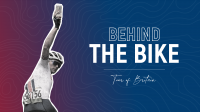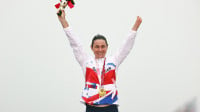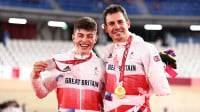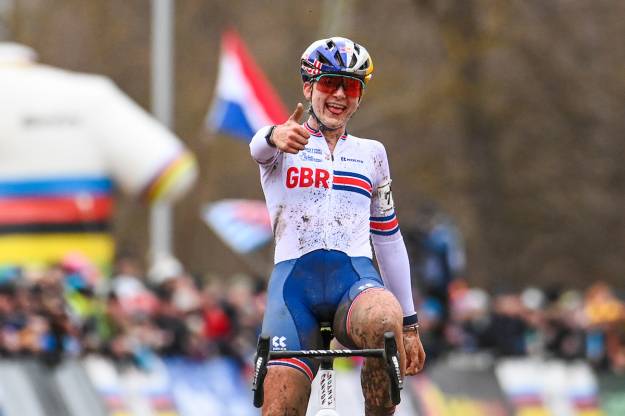The Chris Hoy Life Story
Story posted October 9; by Larry Hickmott

Chris proudly shows off his book, which is published on October 15. Details on the book here
Larry Hickmott writes: Over the last ten years I can honestly say that there has not been an athlete I have enjoyed working with more than Chris Hoy. He has made my job that much easier and rewarding and for that I will always be thankful. I was therefore really curious when I sat down to read his new autobiography about what I would learn on this fascinating athlete.
At the launch of his book at Manchester Velodrome, the Editorial Director at Harper Collins, Susanna Abbott, spoke eloquently about not only how Chris had inspired her to ride her bike but also about Chris Hoy the athlete. "Humble" was one word Susanna used and Chris certainly comes across as humble in the book, just as he does in real life.
I found it was a really positive book to read: following his life from juggling different sports as a youngster to the end where a stranger’s picture in Prague finishes the book off with a tear-jerking moment. In fact, I am sure there will be tears from some readers, but mainly tears of joy for the athlete who showed ‘potential’ early on in his life and many years on has grasped that potential and made the most of it in a way that probably even he didn’t realise he’d be able to do.
Chris shares many personal moments and even manages a significant confession from Beijing which suggests things could have gone very differently. Chris also sheds light on the crash that almost ended his career in Copenhagen and the ‘villian’ who many hold responsible for it. But, even when addressing this issue, Chris is shows none of the fire that we see on the boards. He is ever the gentleman when he is off the bike.
In less than 24 hours, I’d managed to read all 287 pages and come away wanting to read it again in the vain hope I might manage to remember many of the fascinating things he talks about so I can recall them in the interviews to come in the future. One ‘yarn’ about a Keirin race in Australia is a corker, as is the Jason Queally moment at the Sydney Olympics and GB coach/manager Shane Sutton comes up in the book a lot too, with many a funny moment recalled.
That second read will have to wait though. What I can say is that many will enjoy this book as much, if not more, than I have: the public because it will help them understand more about Chris and his sport and his commitment to it; and fans of cycling because it will explain why he is the champion he is.
I’ve seen that commitment first hand in training but this book goes in to even more detail, just in case there are any doubt as to how Chris can put himself into a box in training. Future stars of the sport, will also find the nuggets of information in there useful as they attempt to follow in his wheelmarks.
Prior to reading his autobiography, I asked Chris what the inspiration was to write this book? “It was important to remind myself of where I have come from and how far I have come” he said. “I have also enjoyed writing about the behind the scenes stuff both in Beijing and after Beijing. Like things that happened on the day of a race that I haven't discussed before and how the team works.”
This Chris does well, and as someone who came into British Cycling after the introduction of lottery finding, I learnt a lot about what it was like within GB prior to the Sydney Olympics and the struggles that were going on within the team.
Chris went on to add, “My career also follows the path of the GB team, from being a poor relation to where we are now. Back then, we had no funding, no facilities, no coaches and overnight we got the velodrome, then the lottery funding came on board and the slow process began of transforming the team. It does fill me with a lot of pride to have been part of that process.”
“I never ever dreamt I'd be Olympic champion though. I wanted to be but to have achieved it is something I am really proud of.”
“During the period I had off the bike, I had the chance to reflect not just on Beijing, or that year but my whole life. It has been nice to get it down on paper and document my story, my account of how my life has been up to Beijing. I realise I’m quite young to have written an autobiography but I think at this point in my life, it is good to look back and tell the story of how I got here and hopefully there is more to come.”
Athletes like Chris cram a lot into a small number of years and if there is one thing that I felt after reading the book, it was that the book could have been even more detailed. How lovely it would have been to have had an even more detailed book just on Bejiing, a fly on the wall account of it all because from the nuggets that Chris reveals, village life in Beijing was eventful and perhaps worth a book in its own right. Oh well. Perhaps a publisher will get that story in London 2012.
Moving on, writing books, cutting ribbons, appearing on television and all the other things that have consumed Chris Hoy’s life recently, are however but a side show to the one thing that drives Chris Hoy, and that is being the best at what he can be in the sport he has chosen.
As Chris says in his book, the Olympic cycle – the four years between each Olympiad – can go past very quickly and he is already well into the one between Beijing and London 2012. The start of that four year cycle started badly with the crash in Copenhagen but thankfully for Chris and his fans, his form is now returning.
When we met at the launch of his book, the first question was to ask how he was after a summer of getting over the injury he had from Denmark? “The fitness is very good” Chris explained.
“I have had a very encouraging summer -- my off season – after it started very badly with the crash Copenhagen. Things could not really have gone any better since. I haven’t raced yet (he does soon at the Track Nationals) but in training, the times suggest I’m going very well. The coaches are happy and I’m happy with the fitness.”
“Technically and with the tactics, I’ll be a little rusty in the races and so that is one thing that isn’t 100 per cent but in terms of pure speed, I’m really pleased”.
Asked about his win over Kevin Sireau in France in August, Chris replied “my racing earlier this year at Hyères was a big confidence boost. Sireau had just broken the World record a matter of weeks before with a time that was incredible but I stepped up against him on his home track in a time trial where there are no outside influences such as tactics and to take two and half tenths out of him was really pleasing. To remind him that I was still around and far from being over!”
I put it to Chris that being able to regain his form so quickly after a major layoff, must be a load off his mind and a boost to the confidence in his powers of recovery?
Yes he nodded. “The older you get, the more you question how you are going to recover from such crashes and it showed me that I still have the desire, the same motivation and was enjoying my cycling again. The biggest thing for me is when I’m enjoying my cycling, I perform well and there is a clear link between the two. I have enjoyed being back on my bike because I appreciate what I have got because I know I only have so many years left competing at the highest level so I’m making the most of it.”
“As other demands on my time start to cut back, like the media requests, charity requests and sponsorship requests, I can start to focus more and more on the cycling and I appreciate that.” Chris was then asked , not for the first time, whether he feels he has peaked as an athlete? The reply was an emphatic ‘no’.

A low point in Chris Hoy's career, the crash in Copenhagen, 2009
“I think as athlete if you felt that, you would not keep going because you know you have to keep striving to improve otherwise you won’t stay at the top. Tactically and technically, there is certainly room for improvement and racing experience will help improve that. Physically too, I think I have more to improve because we’re always looking at ways to improve and tweaking the training programmes.”
“The training programmes are so crucial and the most important part of the overall process is about how you train. It is not just a cut and paste generic programme that everybody does. It is individually tweaked (he talks about this in the book) on how a specific athlete responds and the older you get, the more experience you have, the more you can learn from those experiences and make the most of them and tailor the programmes to fit.”
“To have (coaches) Iain Dyer and Jan van Eijden there to support me along with Shane Sutton and the rest of the support staff, I have complete confidence in them and there is nobody in the team sitting back and thinking we’ll just replicate what we did in Beijing. Everybody is looking to improve what they are doing whether it’s the athletes, the coaches, those developing the bikes and so on.”

Another story in the book relates to this tattoo with the Olympic rings. A warning to those riders in Manchester about to follow suit.
National championships and World Cup
“The next World Cup is important not just to me, but the whole team. We had, by our own standards, a disappointing World Track Championships (Poland, 2009) but if you look closer at it, we were the second nation overall and there are not many sports you could say that was a disappointing World Championship performance but we have such exceptionally high standards that it was a little bit disappointing”.
“As Dave (Brailsford) said, if you are going to peak for an Olympic Games, you have to expect a trough, it’s not just about having this continual level. If you want to be exceptional, you have to come down from that.”
“We put in a team (in the World Track Championships) that was young and needed experience and they got that in Poland and lot of them will go on to race in London so it served its purpose. This period in time right now signifies the start of things and we’re hitting the ground running. We’re looking at coming into the World Cup for the team to perform and remind everyone we’re on top.”
The day I spoke to Chris, he was already busy with the press. When I arrived (10.30am) at the book launch, I saw him being photographed near the Reg Harris statue in the velodrome. Chris was the first British athlete to win the Men’s World Sprint title since Reg..
After an introduction by his editor, Susanna, Chris then said a few words about the book to the press gathered for the launch. Then, Chris started a long series of interviews. It was gone 1pm when I left the velodrome and as I drove out, there was Chris outside on the lawn, doing a photo shoot. He then called me to finish off our interview as he was driven to his next meeting.
He admits that dealing with the demands on his time is harder than many expect: “Whilst there are a lot of enjoyable and fun things I get to do, at the same time it gets difficult making the choices I have to make. I have this very small window to capitalise on the success but I’m also still a cyclist and want to get back to doing what I do best.”
“When you’re not able to get back on the track and train and you can see your rivals doing their training, that can be frustrating. You remind yourself it is a long term plan, about London 2012 and not about winning a World Cup three or four months after the Olympics Games. It’s about being Olympic champion.”
As Chris pursues the goal of being Olympic Champion in London, he says he is using the World Cups to gain more ‘race experience’. Looking ahead to a busy month with both the National Track Championships and the Track Cycling World Cup, Chris explained “the next winter will be important to get into some consistent racing and make some progression in the technical and tactical side of things but also to make the most of the time available because time passes by very quickly and if you want to make changes and develop further to improve, you really need to get on with it before the time runs out.”
“Every off season (summer), you're trying to make the most of it physically and then in the winter, trying to gain more experience tactically - so you're trying to make the most of the time you have got.”
The first big competition for Chris will be the Nationals - 20-25 October. Many may feel that for a rider with four Olympic titles to his name, and even more World titles, that the nationals is nothing but a training exercise but read his autobiography and you will see that this is not the case. This year, Chris knows that winning a national title is going to be tough and being the competitor he is, finishing second, third or even outside the medals, will just not be an option.
“It will be good to have the nationals as a hit out just before the World Cup just to get into the swing of using the tactics because I am sure it’s going to be a very tough nationals with the likes of Jason Kenny, Matt Crampton, David Daniels, Ross Edgar and a whole host of guys fighting for that Gold medal. If you're not tactically proficient, you're not going to win it.”
Looking ahead at the World Cup, Chris knows it will be a big challenge. “I haven't raced much at all” he says of the off season. “Doing four events in three days will be a big ask. I think I'll be fine on the first two days but am unsure how I'll hang on during the last day."
After the Manchester round of the Track Cycling World Cup, Chris and his support team will then review where he is at in terms of qualifying for the events at the 2010 Worlds in Copenhagen and see what other World Cups may need to be done. Chris realises he needs to gain experience but also doesn’t want to be spending the whole winter chasing his tail round the world hence why the Nationals and the World Cup on his home track are so important.
Chris admits that the Track Cycling World Cup at Manchester will be a major target this winter but not the biggest target. That is reserved for the World Track Championships. Prior to those, Chris will retreat away from the hustle and bustle in Britain to a place that has for many many years been the perfect place to ‘hide’ and get in some quality training, Perth, Australia. “Perth works well for everybody (in GB) but especially for me where I can make the most of the time and flourish in that environment.”
That environment being Australia which features a lot in his autobiography and probably why I, an Australian, enjoyed it so much. October 15 is when the book is published by HarperCollins and with Chris on the cover in this Great Britain Skin suit, I’m sure it will be difficult to miss on the shelves. Our thanks to Chris for the interview and good luck to him in the coming events.









